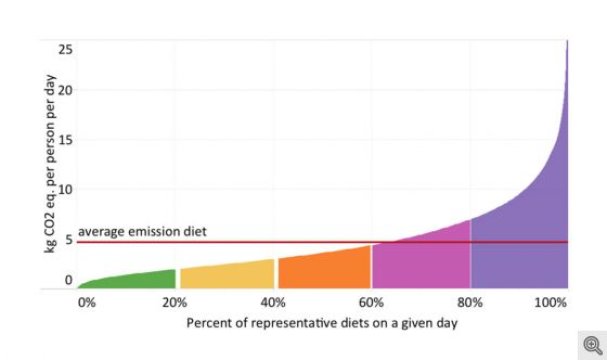On any given day, 20 percent of Americans account for nearly half of U.S. diet-related greenhouse gas emissions, and high levels of beef consumption are largely responsible, according to a new study from researchers at the University of Michigan and Tulane University.
To estimate the impact of U.S. dietary choices on greenhouse gas emissions, the researchers built a database that assessed the environmental impacts involved in producing more than 300 types of foods. Then they linked the database to the findings of a nationally representative, one-day dietary recall survey involving more than 16,000 American adults.
They ranked the diets by their associated greenhouse gas emissions, from lowest to highest, then divided them into five equal groups, or quintiles. The researchers found that the 20 percent of U.S. diets with the highest carbon footprint accounted for 46 percent of total diet-related greenhouse emissions.
The highest-impact group was responsible for about eight times more emissions than the lowest quintile of diets. And beef consumption accounted for 72 percent of the emissions difference between the highest and lowest groups, according to the study.
Reducing the impact of our diets by eating fewer calories and less animal-based foods could achieve significant reductions in greenhouse gas emissions in the United States. It's climate action that is accessible to everyone, because we all decide on a daily basis what we eat.
If Americans in the highest-impact group shifted their diets to align with the U.S. average by consuming fewer overall calories and relying less on meat the one-day greenhouse-gas emissions reduction would be equivalent to eliminating 661 million passenger-vehicle miles, according to the researchers.
That hypothetical diet shift, if implemented every day of the year and accompanied by equivalent shifts in domestic food production, would achieve nearly 10 percent of the emissions reductions needed for the United States to meet its targets under the Paris climate accord, the authors wrote. Though President Trump announced his intention to withdraw the United States from the accord, many states and municipalities are still working to meet the emissions targets.
In the United States in 2010, food production was responsible for about 8 percent of the nation's heat-trapping greenhouse gas emissions. In general, animal-based foods are responsible for more greenhouse gas emissions per pound than plant-based foods. The production of both beef cattle and dairy cows is tied to especially high emissions levels.
For starters, cows don't efficiently convert plant-based feed into muscle or milk, so they must eat lots of feed. Growing that feed often involves the use of fertilizers and other substances manufactured through energy-intensive processes. And then there's the fuel used by farm equipment.
In addition, cows burp lots of methane, and their manure also releases this potent greenhouse gas.
